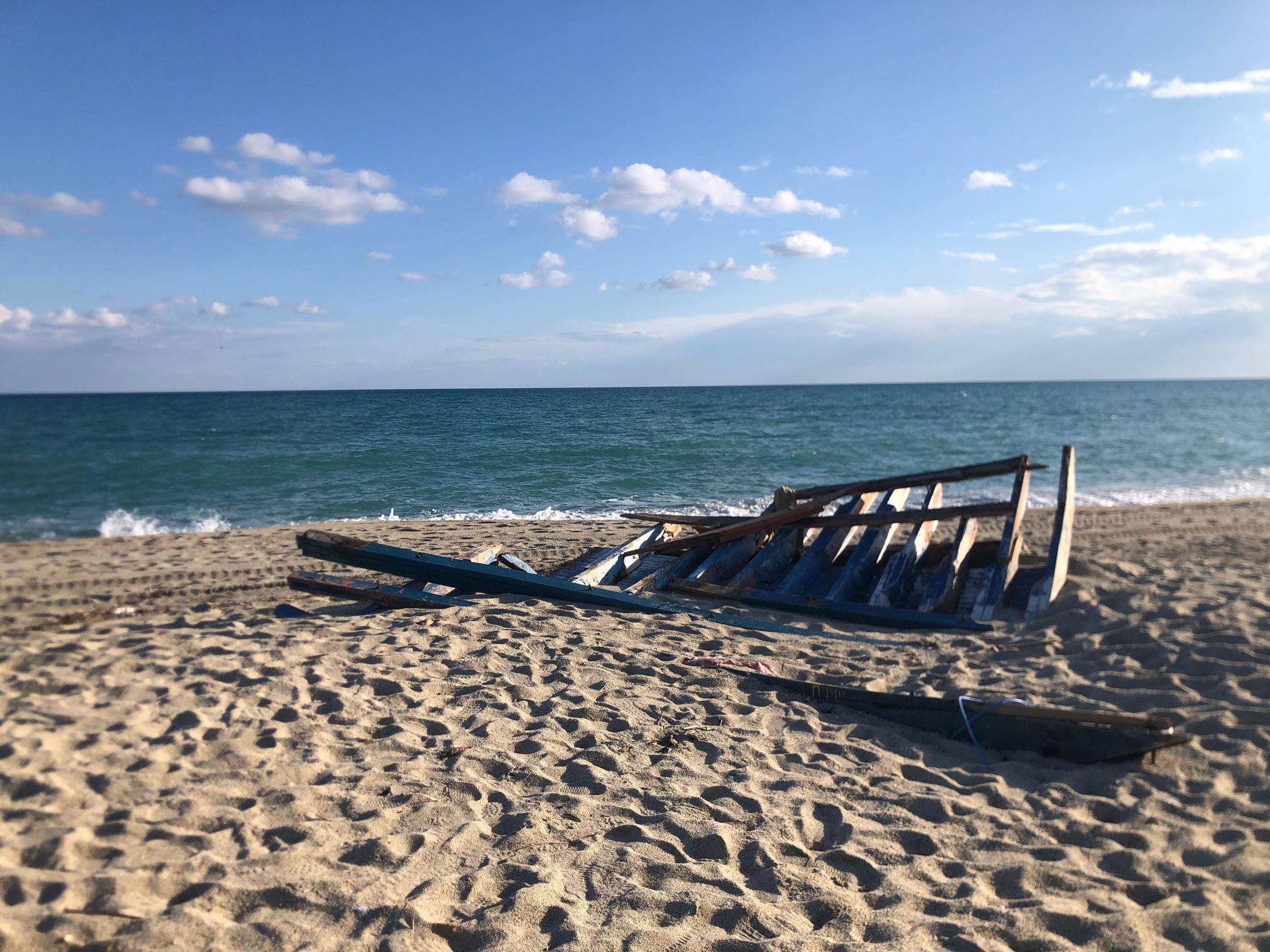
Photo: Chiara Denaro, Alarm Phone
Introduction
Between 1 January and 30 June 2023, Alarm Phone was alerted to 539 boats in distress in the central Mediterranean Sea. The busiest month in the first six months of the year was April, when people on 133 boats reached out to our network. We can expect that by the end of 2023, we will see a new record number of cases, surpassing the previous record of 673 boats to which we were alerted in the whole of 2022. Overall, about 65,000 people reached Italy by the end of June on the Mediterranean route, showing that despite attempts to militarize the sea and contain people in northern Africa, migration stubbornly continues.
This increase in distress calls to Alarm Phone shows that more and more people ‘on the move’ rely on activists as they know that state authorities cannot be trusted and relied upon. In fact, many have been traumatized in encounters with European actors and their northern African allies. Pushbacks, forms of non-assistance and abandonment, as well as violent attacks have become routine and everyday occurrences in the central Mediterranean Sea. For us, though, they will never be normalized. We will do our best to fight against those who prefer to force people back to inhumane conditions or to let them drown at sea than to assist their arrival to Europe. We do so together with the civil fleet, which has rescued thousands of people in distress on 66 boats between January and the end of June 2023.
In this analysis, which covers developments and the experiences we have made over the first half of the year, we first turn to the situation in Tunisia. An unprecedented number of boats has fled the Tunisian coasts and landed in Italy. While many succeeded in reaching Lampedusa, hundreds of people have died on the way. In Tunisia, anti-Black violence and pogroms have escalated over the past months, with hundreds of people forced into the desert by Tunisian forces. Despite these ongoing racist escalations, the EU has agreed on further cooperation and deals with the authoritarian Tunisian government.
We then turn to the situation in and off the coast of Italy. Italy continues to do what it can to prevent boat departures from Libya and Tunisia, not least through dirty agreements with authoritarian leaders and cooperation with their security forces at sea. Italy also provides insufficient rescue resources, meaning that it is often up to the civil fleet and other non-state assets to carry out rescue operations. While Italy continues with its attempts to slow down or block the civil fleet, not least by criminalizing rescuers and sending rescue vessels to ports far away, it should be noted that Italian forces have also carried out a great number of rescue operations over the past months. This situation of ambivalence was highlighted and discussed in the last Echoes report by the Civil Maritime Rescue Coordination Centre, of which Alarm Phone is a member.
Afterwards, our analysis turns to the role of Malta and its armed forces at sea. In the first six months of 2023, Malta rescued only 141 people on five boats to the island-nation even though tens of thousands have reached the Maltese Search and Rescue (SAR) zone. This low figure of arrivals is due to intensifying cooperation between Malta and Libyan militias and a systematic policy of non-assistance and abandonment in the Maltese SAR zone. In May, a large boat with about 500 people on board was ‘disappeared’ from that zone, forcibly returned to Libya. Some of the survivors embarked on another boat a few weeks later and drowned off the coast of Greece in the Pylos disaster.
We then discuss migration movements from Egypt to Libya, seeking to embark on boat journeys from eastern Libya. So far this year, Egyptian nationals are the third largest national group reaching Italy via the sea, traveling frequently on large fishing boats that carry hundreds of people. In light of these departures, the EU has once again heightened cooperation with Egypt and provided further financial assistance.
Finally, we provide a detailed chronology of the events that have unfolded in the central Mediterranean Sea over the past six months. Documenting these developments is important: no other actor compiles such a detailed chronology. We therefore have to create our own archive of migrant struggles and acts of solidarity, as well as forms of border violence at sea.
1 Tunisia: against racism and increasing border violence, continuous struggles for freedom of movement!
In recent months, Tunisia has come under increasing scrutiny from European countries. Faced with the increase of crossings along the Tunisian route, particularly active between Sfax and Lampedusa, the EU and its member states have stepped up their outsourcing policies in an effort to reduce the number of arrivals on the Italian coast. In Tunisia, President Kais Saied has adopted an ambiguous attitude to these policies: reiterating his determination not to turn Tunisia into Europe’s “border guard”, he is steadily stepping up cooperation with European countries on migration control, and fanning the flames of hate speech against Tunisia’s Black population. In the face of rampant racism, violence and violations of the rights of these people, solidarity is being organized despite criminalization, while departures from Tunisian shores are reaching new heights.
The wave of violence following the President’s speech on February 21
Following President Kais Saied’s racist speech on February 21, 2023, the wave of attacks on Black African migrants intensified. Saïed declared that “hordes of illegal immigrants from sub-Saharan Africa” had flooded into Tunisia, causing “violence, crime and unacceptable acts”. He added that this was an “abnormal” situation that was part and parcel of Tunisia’s “political crisis”.
While anti-Black racism is nothing new in Tunisia, the months of February and March were marked by an explosion of violence: people harassed in the street, stones thrown, racist insults, burglaries, rapes… Offering in most cases no protection, the Tunisian police and authorities have, according to testimonies, participated in this violence. During this period, many people were evicted from their homes and fired from their jobs, leaving them homeless and without any resources. Many were forced to flee Tunisia, either by returning to their country of origin where possible, or by taking to the sea, risking their lives. Hundreds were also expelled back to their country of origin under what were presented by the authorities as “voluntary return programs”.
The Tunisian authorities have denied racist violence against Black Africans, and on March 5 announced “new measures” to facilitate the legal residence of migrants, as well as a repatriation procedure for those “who wish to leave the country voluntarily”. These new measures have not, of course, put an end to the violence. For their part, the EU and its member states have remained silent, taking no public stance against the violence, encouraging instead the strengthening of cooperation with Tunisia on migration control.
Mass deportations
The situation for the affected people is dramatic. As this report is being published, some people have been abandoned in the middle of the desert for three weeks, without access to food or water. There have been several reports of people dying as a result of these inhuman measures. A video of a mother who was forced to give birth in the middle of nowhere has also been circulating on social networks. Moreover, there are reports of people being beaten by Tunisian security forces, or claiming that the latter had tried to shoot them. People have walked dozens of kilometers to reach villages, only to be arrested again and deported. With every passing moment, the situation of the expelled migrants worsens, and every day the death toll rises. Dozens of bodies have already been recovered in these border areas.
Alarm Phone has tirelessly alerted the actors who theoretically have the power to provide humanitarian assistance to people in the desert, such as the Tunisian Red Crescent, the IOM and the UNHCR. While some sections of the Red Crescent were able to provide aid to those deported, the IOM and UNHCR remained criminally silent. Although Tunisian civil society is trying to mobilise to provide emergency assistance, a large number of the deported remain inaccessible, being in border areas off-limits to the public.
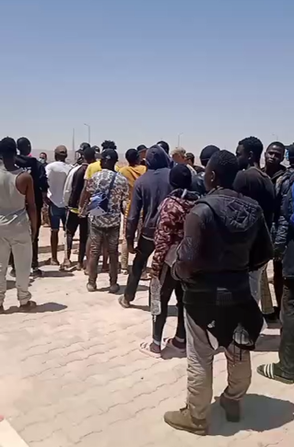
People stranded at the border with Libya. Photo received from the deported
The fate of thousands of people is uncertain. While some have managed to return to their places of residence, many say they have been forced to accept a so-called “voluntary” return to their countries of origin in exchange for humanitarian aid delivered by the Red Crescent, others have been kidnapped by Libyan militias, and still others have had to flee to Algeria, where they risk a chain-refoulement to Niger. The number of people still in the desert is unknown.
On July 5, 2023, MP Moez Barkallah declared that since the first day of the Eid El Idha holiday, almost 1,000 people had been deported every day. These figures should be treated with caution. The Tunisian authorities have a vested interest in inflating these deportation figures, not only to win over part of the population, but also to show European countries that they take seriously the role of border guards assigned to them by the European Union.
Strengthening border externalization policies
As violence and rights violations continue to escalate in Tunisia, European countries have stepped up their cooperation with the Tunisian government to control migration along the central Mediterranean. On June 6, 2023, Italian Prime Minister Meloni visited President Kais Saied “to try and secure a suspended loan from the IMF, to ensure financial stability for the country and to prevent new departures of migrants towards Europe”. On this occasion, a press release was published by Tunisian and transnational civil society to condemn this visit.
In a press release from the Presidency on his meeting with Meloni, Saïed reiterated his “refusal of any diktat“, believing that “those who issue ready-made prescriptions are like a doctor who writes a prescription before diagnosing an illness”. He called for “cancellation of the debts weighing on the Tunisian state, and their conversion into development projects”. The head of the Italian government reiterated that an agreement between the IMF and Tunisia remains “fundamental for the strengthening and full recovery of the country”.
Two days after, on June 8, a political agreement was reached at the Home Affairs Council on the New Pact on Migration and Asylum, which it had presented in September 2020. A general approach was reached on two key pillars of the Pact: the Asylum and Migration Management Regulation and the Asylum Procedure Regulation. A concerning component of the migration package is the extension of the scope of the safe third country concept, allowing the EU member states to apply the concept after an individual examination that ascertains the asylum seeker’s connection with the country, where transit or stay in the country is a sufficient connection (cf Echoes 3)
As analyzed by Politico:
“In practical terms, the migrant must have “stayed” or “settled” in that country or have family members living there, according to the text. But in a key concession to Italy, individual countries will be free to decide whether a foreign country fulfills such criteria, raising the possibility of asking places like Tunisia to accept migrants even if they weren’t born there — a situation similar to the Syrian refugees redirected from the EU to Turkey. […] Under the deal, countries will also have to either accept a certain number of asylum seekers or contribute to a new pot of EU cash to finance undefined “projects” in non-EU countries, potentially including Tunisia.”
Few days after, on June 11, the EU Commission President Ursula von der Leyen visited Tunis with Meloni and Dutch Prime Minister Mark Rutte to meet with President Saied. The parties agreed to work together on a “comprehensive partnership package” that would cover different areas, including migration control. The EU announced it was ready to support Tunisia with a total of more than €1 billion of aid in return for better border control and measures against human smuggling “as soon as the necessary agreement is found,” von der Leyen said. The EU Commission is considering up to €900 million in macro-financial assistance and €150 million in immediate budget support. Further €100 million are dedicated for border management, search and rescue, anti-“smuggling” measures and other initiatives, which also means more boats, mobile radar, cameras, vehicles, spare parts and engines for Tunisia’s security forces.
EU-Tunisia Memorandum of understanding
On July 16, shortly after the wave of violent deportations at the Algerian and Libyan borders, the EU and Tunisia signed a memorandum of understanding for a “strategic and comprehensive partnership aimed at combatting irregular migration and boosting economic ties between the bloc and the North African country. €150 million was announced to achieve this goal. The deal also provides for more Tunisians settled “illegally” in Europe to be repatriated and for sub-Saharan African migrants in Tunisia to be sent back to their countries of origin.
As emphasized by Eve Geddie from Amnesty international:
“by focusing their policies and funding on containment and on outsourcing of border control rather than ensuring safe and legal routes for those trying to cross borders safely, EU leaders are once again embarking on failed policies that are based on callous disregard for basic human rights standards.”
On July 23, another international conference took place in Rome, gathering participants from more than 20 countries, to seek a “new approach to curb illegal migration”. Presidents of Tunisia, the United Arab Emirates and Mauritania, along with EU chiefs von der Leyen and Charles Michel, as well as Filippo Grandi, head of UNHCR, and ministers from Algeria, Egypt, Ethiopia, Jordan, Lebanon, Libya, Malta, Niger, Greece, Turkey, Saudi Arabia and Kuwait attended this meeting.
Although the aim of the conference was to find alternatives to security-based migration management, in the end it was the EU’s old recipes that were once again discussed, with a strong emphasis on the fight against smugglers. However, several countries stressed the need to tackle the “root causes” of migration, such as the “lack of development” and climate change. During the conference, von der Leyen declared:
“We want our agreement with Tunisia to be a template. A blueprint for the future. For partnerships with other countries in the region”.
Civil society solidarity
In the face of growing restrictions on freedom of movement and rampant racism, Tunisian and transnational civil society organize solidarity and resistance. Following the racist speech of Saied, multiple protests have been taking place in Tunisia with demonstrators denouncing the racist and fascist violence. Already on February 25, “over 1,000 people marched through downtown Tunis to protest what they called Saied’s fascist overtures.” Protests in front of Tunisian embassies have been organized around the world, such as in Paris, Berlin as well as Canada.
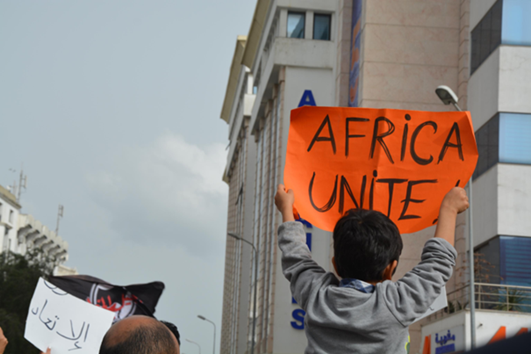
Demonstration in Tunis, February 2023. Photo: Haïfa Mzaloua
In the Front antifasciste – Tunisie, activists and associations gathered to organize support for Black people in the country. Tunisian and foreign volunteers brought donations of food, water and blankets, along with some tents to help those who were expelled from their home.
This solidarity was reactivated during mass deportations, with volunteers coming to the aid of people abandoned in the desert. However, the location of most groups in military zones limited the scope for action. As deportees returned to Sfax, citizens in solidarity organized food distributions. But, as everywhere in the country, this solidarity is criminalized and many volunteers have received threats from the Tunisian authorities.
On the 20th of July, civil society associations from Tunisia, the Maghreb, West Africa, and Europe met in Tunis to express and affirm their disagreement with the migration policies pursued by governments. The participants declared in the statement issued at the end of this meeting that:
“We see the forthcoming meeting in Rome, announced as a Euro-African summit, as a continuation and reinforcement of ineffective and misleading policies whose sole aim is large-scale refoulement and the justification of inhumane and discriminatory treatment of migrants, refugees, and asylum seekers. We recall that in both North and South, the authorities are paternalistic, disempowering citizens and increasingly indulging in authoritarian reflexes that criminalize solidarity and target rights activists and organizations. In increasingly unrepresentative democracies, we are witnessing a political competition between technocrats battling for power and interest groups. Our response is unequivocal: we refuse to see the agreement between Tunisia and the EU as a model to be followed, we denounce it and call for a responsible and participatory dialogue including civil, political, trade union and citizen forces to promote alternative and sustainable solutions, which are conducive to rights.
We, the civil societies of Tunisia, the Maghreb, Africa, Europe, and the rest of the world, must act as a matter of urgency. We continue to defend hospitality against hatred, acceptance against refoulement, open borders against imprisonment”
Mobilization of the civil fleet
On April 17, 2023, a statement launched by the civil fleet and signed by several dozen organizations was published. The various signatories strongly reiterate that Tunisia can neither be considered a safe country of origin nor a safe place of disembarkation:
“We, the undersigned organisations, issue this statement to remind once again that Tunisia is neither a safe country of origin nor a safe third country. Therefore, it cannot be considered as a place of safety for people rescued at sea. Given the Tunisian ongoing authoritarian state transformation and the extreme violence and persecution of the Black population in Tunisia, as well as of people on the move, political opponents and civil society actors, we urge authorities of the European Union and its member states to withdraw their migration control agreements with the Tunisian authorities and express our solidarity with the people concerned […].
The undersigned organisations recall that Tunisia is not a so-called safe country of origin for Tunisian citizens. Furthermore, it is not a place of safety for people from sub-Saharan Africa, Tunisians, and other foreigners transiting through this country. We ask the authorities of the European Union and its member states to stop their cooperation with Tunisian authorities on migration control. We also ask to stop their financial and technical support to the Tunisian Coast Guard, and provide safe routes for all.”
Refugees in Tunisia: a self-organized movement
Faced with worsening living conditions, increasing violence in Tunisia and the inaction of the UNHCR, Refugees in Tunisia continue to mobilize. The following testimony was collected in June 2023, from one of the movement’s leaders:
“Fear, hunger, and a lot of frustration. This is the least that can describe the situation of refugees in Tunisia. Specifically, after President Kais Said’s speech regarding immigrants south of the Sahara and the presence of foreigners in Tunisia, the situation has changed from bad to worse. Many have lost their jobs and homes due to the racist attack by citizens towards foreigners with black skin. Many people sought refuge except their embassy in order to protect themselves from the enemies and violence of the angry Tunisian citizens at the presence of foreigners in their country. They were completely brainwashed and told them that we are here to take their country and to change the democratization of the demographics. We as refugees had no choice either. We resort to the UNHCR to provide us with protection, but unfortunately no one has moved us. Hundreds of refugees have gathered in Tunisia to demand evacuation, except for any safe country, even if it is an African country. We only want a country in which we urge that we are human beings like every person. We continued our peaceful sit-in after a month of our sit-in in front of the United Nations High Commissioner for Refugees. Our sit-in was forcibly dispersed by the police and they fired a barrage of tear gas and we were beaten with sticks. They were detained and determined not to sit-in again. We now feel deep pain and oppression. Our message to the world is that Tunisia is an insecure country, and we do not see any future for us here in light of the society’s lack of acceptance of us. Our biggest dream is to live with dignity in any country that accepts us as human beings.✊🏽”
Boza to Italy
Despite the worsening conditions for people in the move in Tunisia during the last few months, despite the increasing violence perpetrated by the Tunisian Garde nationale (Coast Guard), and despite the strengthening of border control cooperation between Tunisia, Italy and the EU, more than 75.000 people made it to Italian shores (the majority departing from Tunisia) until the middle of July 2023. On the 29th of June, a record number of 46 boats reached Lampedusa in a single day, mainly coming from Sfax. Along the Tunisian road, as elsewhere, Alarm Phone will continue to support those who fight tirelessly to exercise their right to freedom of movement!
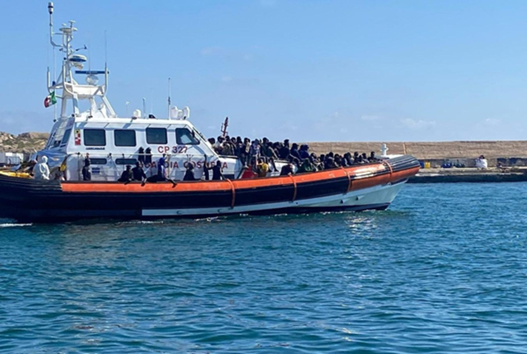
Arrivals to Lampedusa, July 2023. Photo: Maldusa
2 Italy’s (failed) attempts to reduce sea arrivals
Over the first half of 2023, and despite increasingly systematic and violent interceptions, sea arrivals to Italy reached 65.000 people, most of whom were individuals fleeing the Ivory Coast, Guinea Conakry and Egypt. Most of the boats that reached Italy departed from Tunisia, others from Libya, Algeria or Turkey. These arrivals challenge the Italian government’s anti-migration promises made before coming into office, when it was suggested that sea arrivals would be brought down, not least through a “naval blockade”.
The Italian government has deployed different strategies to reduce the number of arrivals: i) strengthen political agreements with Libya and Tunisia, with a view of enhancing externalization policies, by preventing departures at all cost; ii) limiting NGOs’ operational capacity and criminalizing them further; iii) intervening on migration management and asylum policies, in order to further strengthen the so-called hotspot approach and to further shrink pathways for asylum and, more broadly, opportunities to legally remain on Italian territory.
Despite the many socio-economic challenges faced by Italy, the so-called “management of migration flows” was the first topic to be addressed by the right-wing government through the so-called Piantedosi Decree (Law Decree 1/23, 2 January, turned into Law 15/23). This happened despite civil society vessels rescuing less than 10% of the people who reach Italy. The government showed its (only) political ambition: namely, limiting NGO rescuers’ presence at sea and their rescue capacity. On January 26, the EU Commissioner for Human Rights, Dunja Mijatovic, asked the Italian Government to withdraw the decree and newly implemented measures. Such measures include the so-called “distant port strategy”, forcing NGO vessels to immediately direct to assigned ports that are very far away. These measures also prevent NGO rescuers from carrying out multiple rescues, affecting the efficiency of SAR missions, and exposing survivors to useless additional suffering during prolonged journeys at sea. NGOs who disobeyed the order of reaching a distant port “without delay” – as Mare Go did on June 2 – were criminalized and objected to administrative siege.
Italy’s attempts of preventing departures and hindering NGO rescue activities did not stop, even after the horrible Cutro shipwreck, which occurred on 26 February 2023. That shipwreck, where a boat departed from Turkey with about 180 people on board – mostly fleeing Afghanistan, Pakistan and Syria – capsized only a few hundred of meters away from Calabria’s coast, leading to at least 94 lives being lost, amongst them 28 minors. While more than 40 civil society organizations filled a joint criminal report, asking Crotone Public Prosecutor to launch an investigation to assess state liability for those deaths, the Italian government carried out a shameful act of instrumentalization, issuing new urgent measures to combat trafficking and smuggling and calling it “the Cutro decree”, then converted into Law 50/23.
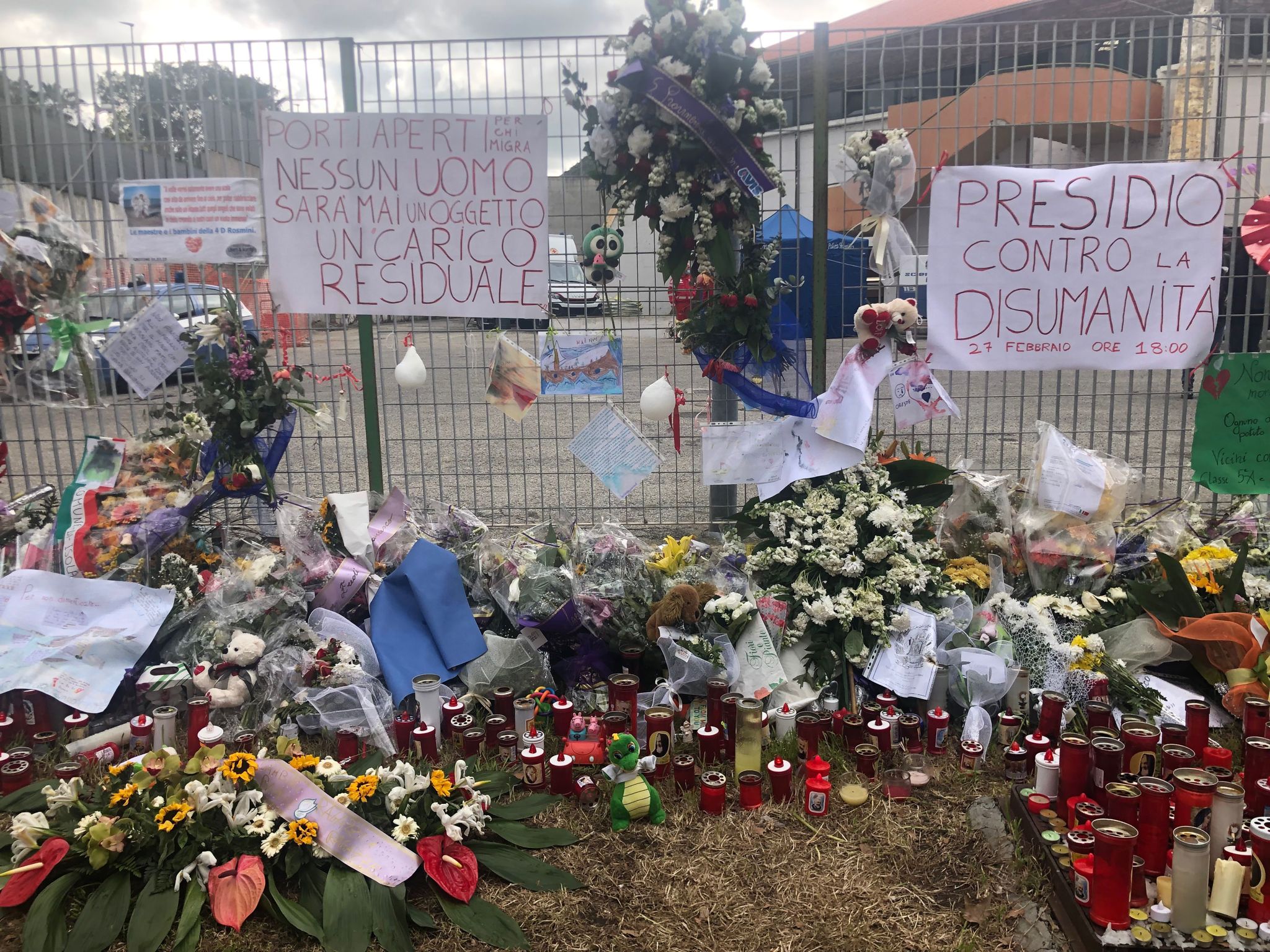
Photo: Chiara Denaro, Alarm Phone
While the Cutro shipwreck shed light on Frontex’ role in SAR operations – its airplane had spotted the boat more than 24 hours before the shipwreck – and on the inadequacy of decisional processes by the Italian authorities who categorized the event as a law enforcement incident and thus failed to send any rescue assets, the government sought to blame the boat drivers as the only ones responsible for those deaths. On the contrary, an inquiry by Lighthouse Reports revealed the obvious truth, showing how Frontex and Italy could have prevented those deaths.
At its core, in addition to the increase of penalties for boat drivers, the introduction of these new measures aimed at restricting the legal channels for people arriving by sea. These new measures were imagined in parallel with the extension of the safe countries of origin list – which now includes Ivory Coast, Senegal, Gambia, Nigeria, in addition to Tunisia, Algeria, Egypt and Morocco. This is an additional tool trying to prevent people from seeking asylum in Italy, facilitating expulsion and deportations, and opening-up new avenues for detention at the border. The mid-April Italian declaration of the state of emergency over migration represents an additional and dangerous tool concerning migration management, allowing extraordinary procedures to open new possible spaces of confinement for people on the move.
On the externalization front, the interlocutions between the Italian Prime Minister Giorgia Meloni and the authorities of North African countries continued. Italy received General Haftar in Rome, with the aim of going beyond the consolidated cooperation with Tripoli government – formalized through the Italy-Libya MoU – and extending Italy’s influence on Eastern Libya, also in light of increased boat departures from that region.
In parallel, the dialogue with Tunisian President Kais Saied was brought forward, with the aim of strengthening Tunisia’s border management apparatus to prevent boat departures, and to facilitate repatriations of Tunisian nationals. As in 2018, with the project of creating a disembarkation platform in Tunisia, the idea to return to Tunisia also non-Tunisian nationals was still on the table, but Saied did not accept the proposal.
3 European acts of non-assistance and intensifying violence against people fleeing from Libya
Until the end of June 2023 more than 8.700 people were intercepted by different Libyan border guard factions at sea. The (not so) secret agreements between Libyan authorities and Malta as well as Italy lead not only to continuous interceptions at sea, but also to increasing raids and arrests on land. People on the move are intimidated and supposed to be prevented by Libyan forces from taking boats. The racist hate speech by the Tunisian autocrat Kais Saied against Black people on February 21 was noticed also in Libya. Black people from western African countries were attacked and hunted also there and had to hide in their houses for several weeks.
But despite efforts by EU member states and their northern African allies to keep people in the precarious and dangerous conditions, and prevent their departures, many still manage to escape. In the first six months of 2023, Alarm Phone received distress calls from 143 boats that had left from western Libyan cities around Zuwarah and the very east of Libya, mainly around Benghazi and Tobruk. Given the insufficient number of rescue assets in the central Mediterranean Sea, Alarm Phone has tried to get merchant vessels to proceed to distress cases and carry out rescue operations.
The continuous non-assistance by state actors, in particular Malta but also Italy, has again led to deaths at sea. On March 11, only two weeks after the disastrous shipwreck close to Cutro in Calabria, 30 lives were lost while only 17 people survived after being rescued by a merchant vessel. When the group of 47 people got in distress in extremely bad weather and sea conditions and called Alarm Phone, Italy and Malta failed to engage in rescue activities, instead referring to the so-called Libyan Coast Guard as the responsible and ‘competent’ authority. JRCC Libya informed Alarm Phone that it needed to wait for a Libyan vessel from Benghazi. Several hours later, when it became clear that no Libyan asset was available, the merchant vessel Froland was ordered to take the distressed onboard. This came too late for 30 people. The 17 survivors were brought to Malta, where they were detained. The 30 deaths are the clear consequence of European authorities preferring to wait for a pushback instead of saving lives. After this shipwreck made by Europe, the European Commission promised to provide the Libyan authorities with more patrol boats.
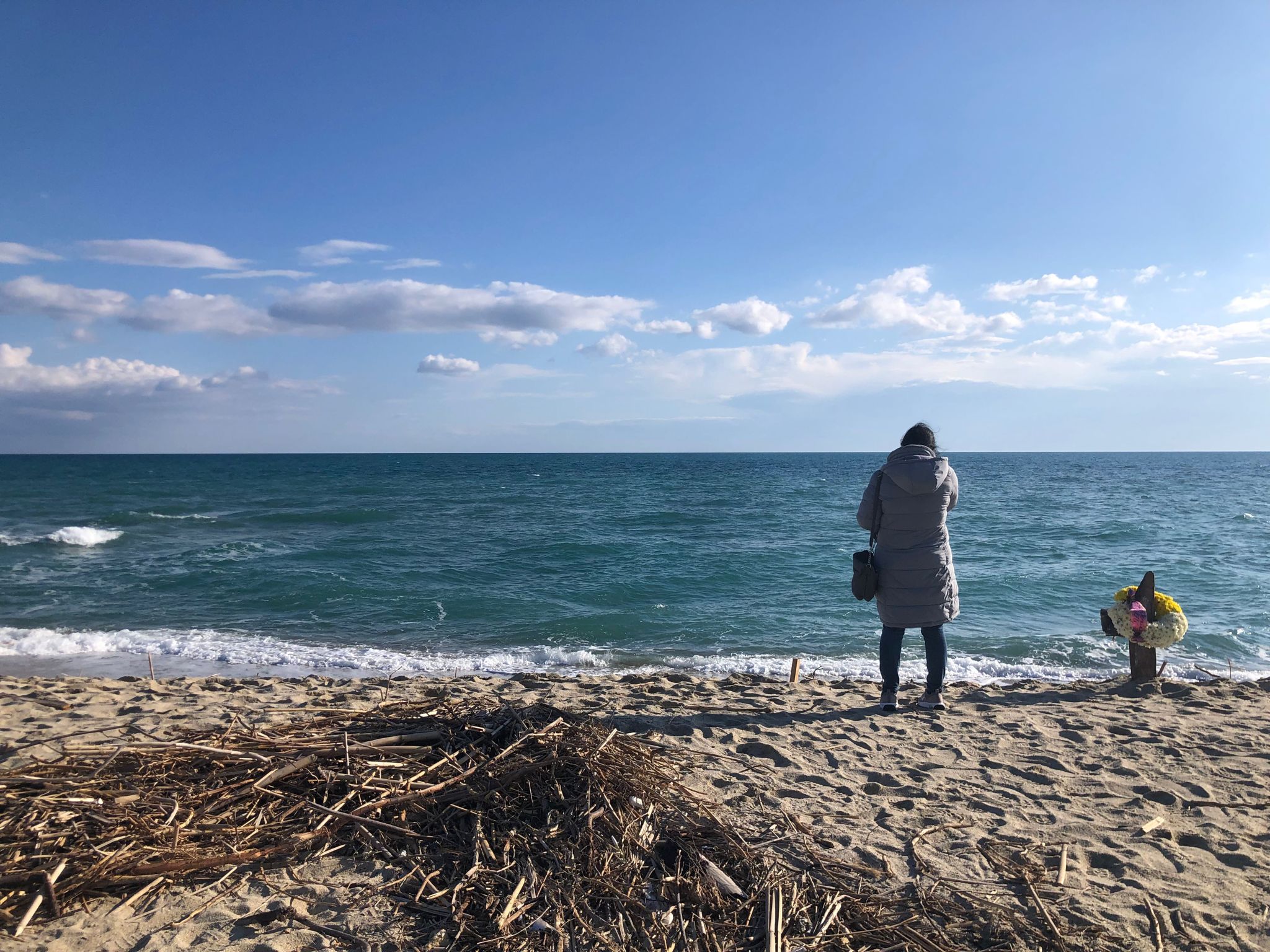
Photo: Chiara Denaro, Alarm Phone
In the first six months of 2023, only 141 people on 5 boats in distress were rescued to Malta. All of them were able to escape from Libya. Alarm Phone was in touch with three of these boats in distress. On April 17, we were alerted by people on two boats who had left from Benghazi. Only after building up a lot of pressure, two merchant vessels – the Vasilis and Triton – rescued the people and eventually brought them to Malta, where the survivors were detained. A third boat with 42 people, who didn’t call Alarm Phone, was rescued to Malta by an unknown merchant vessel one day later. When they were rescued, two deceased persons were found – they had presumably died during the journey.
On June 20, another boat with 29 people escaping from Benghazi got in distress. Smaller boats such as this one seek to reach Italy but often run out of fuel and are then adrift in the middle of the sea. In this case, as so often before, RCC Malta first failed to take action. Only with delay did it order the merchant vessel GRETA to rescue, which afterwards changed its route to Malta and disembarked survivors there.
In Malta, people who arrive via the sea and if they apply for asylum are detained for at least nine months. Often, they are not allowed to inform their relatives that they survived their journeys. This is why relatives regularly call Alarm Phone to ask for information. They are also worried because Malta rejects most asylum applications. Several of the main countries of origin of people crossing the sea are listed as so-called “safe countries” and many get swiftly deported.
On May 23, a boat with about 500 people on board called Alarm Phone when adrift in international waters. Their big fishing vessel was deep inside the Maltese search and rescue zone but was nonetheless abducted by the Libyan vessel “Tariq Ben Zeyad”, after Alarm Phone had lost contact with the people the day before. The airplane Seabird of Sea-Watch as well some ships of the civil fleet searched for many hours for the boat but in vain – 500 people seemed to have disappeared. But soon after we received shocking news via relatives: Rather than rescuing those on board, the Maltese authorities either coordinated or allowed an operation in the Maltese SAR zone, in which the people were towed 330 kilometers back to Libya.
After the pushback by proxy to Benghazi, several hundreds of people were forced to cross the land border to Egypt by foot. Others were forcibly detained in a Libyan prison that is – just like the vessel – run by the Tariq Ben Zeyad Brigade, a militia that is reported to have been responsible for extensive war crimes, extrajudicial executions, torture and rape.
In the aftermath, the Maltese government repeatedly claimed to not have known about what had happened in their search and rescue zone. According to the Armed Forces of Malta, no boat in distress was found at the position Alarm Phone had alerted them to. Only a few days later, a delegation of Maltese officials met with Libyan leaders in Benghazi and Tripoli to negotiate further cooperation against the freedom of movement of people on the move, trying to escape from Libya.
4 Egyptian departures from eastern Libya
According to the UNHCR, Egyptian nationals are the third largest national group that reached Italy via the sea so far this year. They depart not from Egypt but in particular from Libya. People from Egypt commonly pass through the Egyptian-Libyan land border or airports to eastern Libya. Thousands of people have arrived via Benghazi Airport, following formal procedures. From places like Tobruk they embark on boats, often large fishing boats, to cross the Mediterranean Sea to Italy.
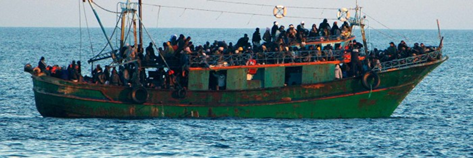
Tobruk 2022. Photo: Mohamed Rashid
Boats crossed from Egyptian shores especially between 2013 until 2016 and declined from 2017 on, when the Egyptian state began to intervene more heavily through a number of security measures. Subsequently, the number of Egyptian nationals reaching Europe declined for some years but has picked up considerably, especially from 2022 on.
The increase in Egyptian nationals reaching the EU led the EU to sign an agreement with Egypt, which includes a transfer of 80 million Euro for a border management programme. Further funds were made available in February 2023, when the EU Delegation to Egypt and the Egyptian Ministry of International Cooperation met under the programme of “Combating Migration Challenges in Egypt” and agreed on the transfer of over 60 million Euro to Egypt under the EU Trust Fund for Africa. In March 2023, Egypt also concluded an agreement with Italy to expand cooperation between them in the areas of combating irregular migration.
In June 2023, thousands of Egyptian nationals were violently forced to leave eastern Libya by foot, following raids of warehouses where people waiting for their departure were staying. According to Libyan security actors, about 4.000 people were deported in this way, while other sources provide a higher figure.
In the meantime, the conflict in Sudan has meant that Sudanese refugees have moved into Egypt. Initially, Egypt received thousands of Sudanese fleeing the conflict, according to the UNHCR. The number of displaced people from Sudan who arrived in Egypt reached 160,000 in the first month. Egypt then declared in mid-May that no one without a passport or visa would be allowed to enter.
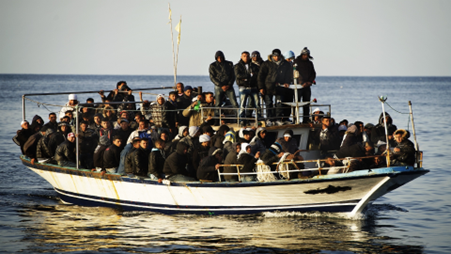
Photo: Getty
5 Alarm Phone Chronology, January-June 2023
January
In January 2023, Alarm Phone was alerted to 71 boats in distress in the Central Mediterranean Sea, 17 of them departing from Libya and 54 departing from Tunisia. Six of these boats were rescued by NGO vessels, one was a transshipment from a merchant vessel and one other boat was rescued by a commercial ship. At least 18 boats arrived in Lampedusa autonomously or were rescued close to the island by the Italian Coast Guard. We know of nine interceptions by the so-called Libyan Coast Guard and of eleven shipwrecks in total, three of which were Alarm Phone cases and almost all shipwrecks occurred off the coast of Tunisia.
On 1 January, Alarm Phone received a distress call from a boat carrying 50 people in the Maltese SAR (Search and Rescue) zone. They were eventually rescued by the Italian Coast Guard to Lampedusa.
On 2 January, we were called by a boat in distress with about 170 people onboard. They were later rescued to Augusta, Sicily. For 700 other people in distress on a boat off Calabria, a rescue operation was carried out by the Italian Coast Guard.
On the same day, the Geo Barents, after having rescued 41 people from a boat that capsized in international waters off Libya, undertook a transshipment of 44 people from a merchant vessel, as requested by the Italian Maritime Rescue Coordination Centre (MRCC).
On 5 January, a joint statement of 20 civil rescue organisations was published against a new decree of the Italian government, warning that it would lead to even more deaths in the central Mediterranean.
On 6 January, three people, among them a newborn, died in a shipwreck off Lampedusa. On the same day, at least five people died and another ten were missing after a boat sank off Louata, Tunisia. The Coast Guard rescued 20 people.
On 7 January, a shipwreck was reported off Libya. 48 people were rescued and brought back to Libya – one person died.
On the same day, the Ocean Viking and the Geo Barents rescued boats which had alerted Alarm Phone and then they got assigned Ancona as port of disembarkation, 1,575 km away from the area of operation.
On 8 January, Alarm Phone was alerted by a boat carrying 45 people close to the Libyan coast, which was returned, and another boat with 56 people on board which reached Lampedusa.
On 9 January, Mohamed Mahmoud Abdel Aziz, a refugee in Libya, committed suicide after being brutally detained for protesting for his rights at the UNHCR office in Libya.
On 10 January, one year after the brutal eviction of Refugees in Libya at the UNHCR office and when many of them were forced into Ainzara detention camp, survivors returned to ask the Libyan authorities and UNHCR to release their fellow protestors and grant protection to all.
On 13 January, Mohamed Emran, a 27-years old from Bangladesh, died in the hotspot of Lampedusa. It is believed that he had suffered of heart problems, worsened by the hard work he had to carry out in Libya.
On 19 January, Alarm Phone was called by a group of about 43 people in distress off Benghazi, East Libya. On the next day, the merchant vessel IBLEA found the boat in distress and took all people on board in order to disembark them in Italy.
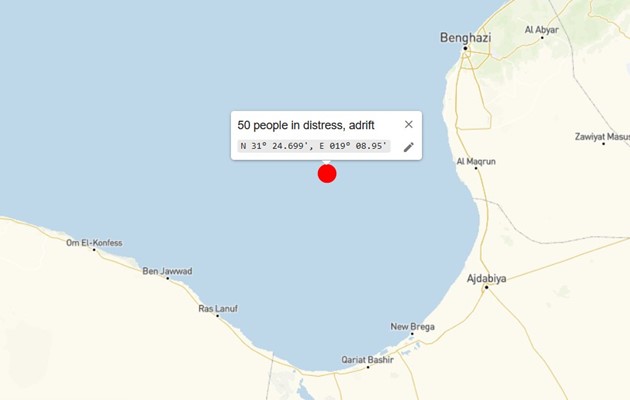
Map showing the position of the boat rescued by the merchant vessel IBLEA. Position added by Alarm Phone
On the same day, two important court decisions were released. One concerned the shipwreck of 11 October 2013: The Italian Coast Guard and Navy were declared responsible for the deaths of 268 people. The second ruling concerned the Asso28 case and confirmed that the pushback to Libya was illegal.
On 24 January, the Geo Barents observed an interception by the so-called Libyan Coast Guard in international waters. As they approached the boat to rescue the people, they were threatened.
On the same day, a boat sank off Garabulli, Libya. 92 people were rescued, nine bodies recovered.
On 25 January, the Geo Barents rescued two boats which had alerted Alarm Phone in distress in international waters near Libya. Italy had already assigned them La Spezia as a place of safety – again far away from the area of rescue.
On the same day, the Ocean Viking rescued 95 people, who had called Alarm Phone from an overcrowded rubber boat off Libya. Four people were reported missing.
On 26 January, at least eight people died and 58 went missing after their boat – carrying at least 150 passengers – capsized off Libya. 84 people survived and were taken to detention centres.
On 28 January, Italian Prime Minister Meloni visited Tripoli and Libyan President Dbeibah announced that Italy would provide five “fully equipped” boats to Libya’s Coast Guard “to help stem the flow of migrants to European shore.”
On 30 January, a boat sank off Sfax, Tunisia. The Coast Guard rescued 24 people, 13 people went missing.
On the same day, the police of La Spezia boarded the Geo Barents to begin investigations into the possible violation of the so-called ‘Piantedosi decree’ which requires NGO ships to arrive at the safe port without stopping to operate further rescues as soon as they receive the indication of the landing.
On 31 January, Alarm Phone reported that during the last weekend we were alerted to seven boats that had left Tunisia in bad weather conditions. At least three boats went missing, feared to have capsized.
February
In February, Alarm Phone was alerted to 50 boats in distress, among them ten boats departing from Libya and 40 from Tunisia. Eight of these boats were rescued by NGO vessels, at least 30 arrived in Lampedusa, three in Pozzallo/Sicily. We know of ten interceptions by the so-called Libyan Coast Guard (only one of them an Alarm Phone case) and of six shipwrecks (all of which weren’t Alarm Phone cases).
On 3 February, eight people were found dead on a boat which was rescued by the Italian Coast Guard in the Maltese SAR zone. One of the victims was a four-month-old baby.
On 4 February, dozens of people gathered in Tunis to commemorate those who died or disappeared in the Mediterranean and to denounce the silence of the Tunisian authorities and the murderous EU border regime.
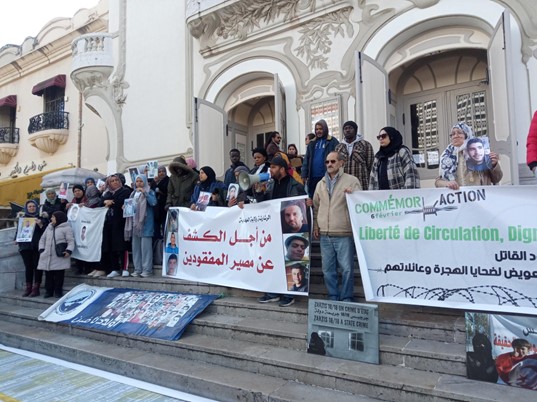
Manifestation in Tunis on 4 February 2023. Photo: Alarm Phone
On 5 February, activists denounced Malta’s murderous migration policy. Shoes were laid down in Valletta to mark the lives lost at sea.
On 6 February, families and activists gathered in more than 40 cities around the world for CommemorActions against the militarization of borders and for freedom of movement for all.
On the same day, 100 survivors and two bodies were disembarked from Sea Eye in Naples and about 800 people were rescued by Italy to Sicily.
During the weekend before, more disasters occurred on the Tunisian route, with several shipwrecks and at least three boats going missing.
On 7 February, about one hundred activists protested in Italy against the shameful ceremony at which the Italian government and the European Commission handed over a new patrol boat to the so-called Libyan Coast Guard.
On 9 February, a large fishing vessel that left from Tobruk, carrying more than 400 people, was intercepted and escorted back to Tobruk by Libyan Special Naval Forces.
On 10 February, 21 civil sea rescuers, among them the Iuventa crew, had to face trial, again.
On 13 February, the court in Catania ruled in favour of survivors on the Humanity 1 and declared the Italian decree of November 2022, especially the selective disembarkation, as unlawful.
On the same day, Italy assigned the distant port of Ancona to the Geo Barents and a criminal investigation was opened against “unknown person(s)” for aiding and abetting illegal immigration after the Geo Barents’ disembarkation of survivors in La Spezia.
On 14 February, the Ocean Viking rescued 84 people who had alerted Alarm Phone, and was assigned Ravenna, northern Italy, as port of disembarkation.
On the same day, a delegation of the so-called Libyan Coast Guard Security met with the commander of AFM and staff in Valletta to prepare joint naval exercises.
On 15 February, a shipwreck off Qasr Al Khyar was reported: A boat carrying 80 people, which had left from Al Khoms, sank the day before. Eleven bodies were recovered and seven people rescued – 62 went missing.
On 16 February, the Aita Mari rescued 31 people crammed into a small wooden boat between Tunisia and Lampedusa, and was ordered to disembark them in Civitavecchia.
On 18 February, media sources reported that during the last three days, 2,700 people disembarked in Lampedusa. Sixty small boats arrived while 2,500 people were blocked and intercepted by the Tunisian Coast Guard.
On the same day, the Italian Ambassador in Tunisia had a meeting with the Director General of the National Guard about collaboration to combat irregular migration.
On 19 February, Alarm Phone was alerted by a boat in distress with about 55 people on board who fled from Benghazi. They reached the Maltese SAR zone. Later, we heard that there were two boats. Only on 21 February we learned that they were rescued by the Italian Coast Guard to Pozzallo.
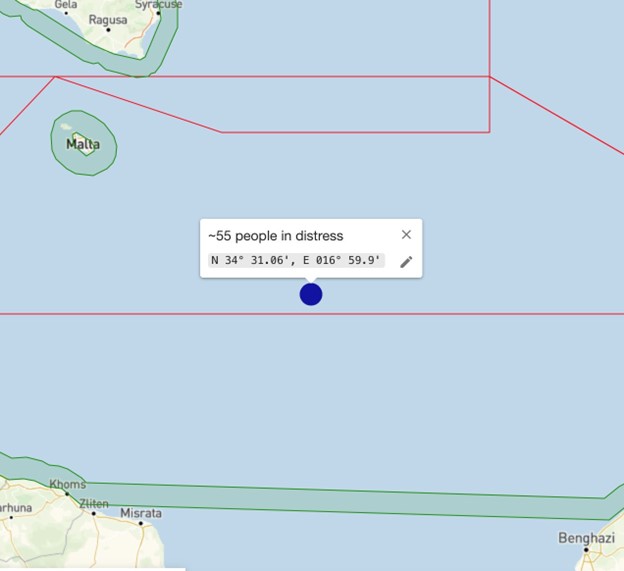
Map showing the position of the boat in distress in the Maltese SAR zone. Position added by Alarm Phone
On 21 February, the Tunisian President Kais Saied held a speech at the National Security Council meeting, portraying post-2011 programs aimed at settling Black African migrants in Tunisia as a conspiracy to make the country “a purely African country with no affiliation with the Arab and Islamic nations.” In his racist speech, he stressed
“the need to quickly put an end to this phenomenon, especially since the hordes of irregular immigrants from sub-Saharan Africa are still continuing with the violence, crimes and unacceptable practices they lead to, in addition to being legally criminalized.”
On the same day, Alarm Phone, together with several civil rescue organisations, published a press release “Three thousand people in the Lampedusa hotspot: it is not an emergency, but a political choice!”, with urgent demands concerning transfer and accommodation.
On 22 February, Alarm Phone was contacted by a boat carrying 34 people fleeing Benghazi, drifting in the Maltese SAR region. One day later, the people were still at sea, but they reported seeing a white boat approaching them. We assume that it was the Italian Coast Guard and hope they were rescued.
On 23 February, Italian authorities came on board the Geo Barents and a fine was applied. MSF was assessing legal actions to take against this criminalisation.
On 24 February, two boats carrying 66 people, who had alerted Alarm Phone, were rescued by Italy to Pozzallo.
On 25 February, a speaker of the African Union condemned the racist attacks against Black people in Tunisia. Hundreds protested in Tunis against the president’s anti-migrant clampdown.
On 26 February, a shipwreck occurred off Cutro near Crotone, Calabria. About 200 people were on the fishing boat that broke into two due to rough seas, not far from the coast. Only 80 people survived. Authorities and Frontex failed to act. Focussing on smugglers neglects the primary responsibility of racist governments like Italy in producing this mass suffering!
|
Poem written in February 2021 by Mahmoud Bakir, a young Palestinian man who died in this shipwreck Tell the sea after the news of my death |
On 27 February, at least 22 Syrian migrants went on a hunger strike in a Libyan prison to demand their release.
On 28 February, Libyan authorities deported 155 people of Sudanese nationality from Benghazi to Sudan.
March
In March, Alarm Phone was alerted to 100 boats in distress, 15 of them departing from Libya and 85 from Tunisia, most of them from Sfax. Six of these boats were rescued by NGO vessels, at least 43 of them (and many others) arrived in Lampedusa, one in Sicily and one in Calabria. We know of ten interceptions by the so-called Libyan Coast Guard and of 14 shipwrecks (twelve from Tunisia, two from Libya – ten of which were Alarm Phone cases).
On 1 March, more details about the shipwreck off Cutro were revealed: The harbour master said that they could have sailed even in worse weather conditions but were not alerted. Frontex said that they had warned Italy of possible a “large number of people” on the boat before the shipwreck and published photos and a video of the boat in distress.
On 2 March, one hundred pick-up trucks for border control were delivered by Italy to Tunisia.
On 3 March, Alarm Phone published a solidarity statement for the relatives and friends of those who did not survive the Cutro shipwreck.
On the same day, the Italian Coast Guard rescued 211 people who had alerted Alarm Phone off the coast of Lampedusa in adverse weather conditions.
In Tunisia, massive racist attacks on Black people started after the publication of a press release by president Kais Saied. Hundreds were evicted from their homes and lost their jobs. Guinea and Ivory Coast evacuated some of their citizens and condemned the “shocking statement issued by Tunisian authorities targeting fellow Africans.”
On 7 March, MSF lodged a court appeal against the detention of their ship Geo Barents and urged authorities in Italy to annul the law under which it was detained.
On 9 March, Alarm Phone was informed that the Tunisian Coast Guard had attacked five boats trying to escape from Tunisia and stole their engines. About 200 people were left adrift while the Coast Guard was watching. We learned that the people were brought to land by fishermen who showed solidarity with the distressed.
On the same day, 1,175 people landed in Lampedusa. But there were also two shipwrecks off Lampedusa (20 and 38 people could be rescued) and another boat sank off Tunisia – 14 bodies were found and 54 people rescued.
On 10 March, Alarm Phone was alerted by about 500 people on a large boat in the Italian SAR zone, which had left from Libya. We knew about a rescue operation of the Italian Coast Guard in the Ionian Sea for about 1,000 people on at least three big boats. But only on 11 March we learned that the people of ‘our’ boat were rescued, 24 hours after we had alerted authorities.
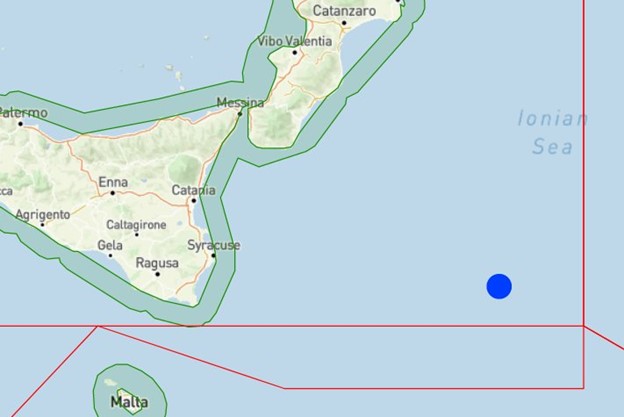
Map showing the position of the boat in the Italian SAR zone. Position added by Alarm Phone
On the same day, according to media reports, the Tunisian Coast Guard intercepted 25 boats, carrying more than 1,000 people who tried to escape to Europe.
On 11 March, Alarm Phone was contacted by 47 people on a boat adrift who fled from Libya. Near it, a merchant vessel had received orders from MRCC Rome to coordinate with the so-called Libyan Coast Guard, who did not react.
On 12 March, three merchant vessels were at the scene of distress. We learned that 30 people from this boat drowned, only 17 people, all from Bangladesh, were rescued by one of the merchant vessels and finally brought to Pozzallo. On 14 March, we published a joint statement about this case with a timeline.
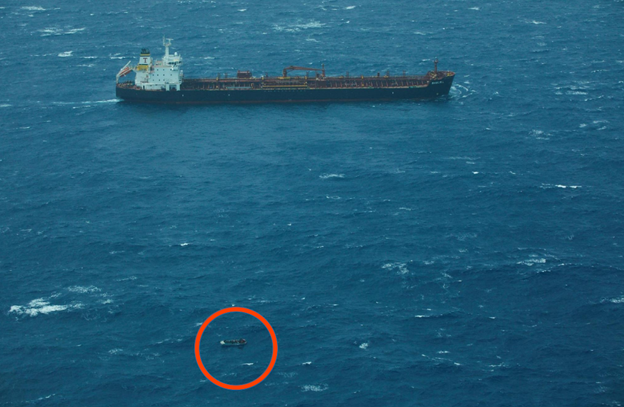
Photo: sea-watch.org, Christian Gohdes
Also on 11 March, there was a national demonstration in Cutro. The Italian government refused to pay for the repatriation of the bodies and proposed a new decree that will further criminalise those seeking protection.
On 13 March, the European Commission said that Libya needed more boats after the latest drowning tragedy.
On 16 March, a hearing of the court about the Iuventa case took place in Trapani. The judge issued an order confirming the competence of the Italian authorities over rescues in the central Mediterranean.
On 18 March, a parade for the victims of the sea border was organised in Palermo, to remember especially the Cutro shipwreck.
On 21 March, it was revealed that the EU would deliver two more boats to the so-called Libyan Coast Guard and radar equipment for Tunisia’s coastal surveillance.On the same day, Sub-Saharan Africans held a protest vigil outside the UNHCR headquarter in Tunis demanding evacuation to safe countries, following the recent racist assaults. Some were able to leave on repatriation flights, others remained camped out in front of the offices of UN agency in Tunis.
On 22 March, at least five people drowned and another 28 were missing off Tunisia after a boat capsized. We learned that it was a boat that Alarm Phone had been informed about.
On 23 March, the Tunisian Coast Guard published that they thwarted 30 sea crossing operations off Sfax and Chebba and intercepted 2,034 people on the move.
On the same day, the Italian Coast Guard rescued two big boats, one off Calabria carrying 295 people, another one off Sicily with about 450 people on board.
On 24 March, at least 34 people went missing after a fifth boat sank off Tunisia in two days.
On the same day, about 190 people who had alerted Alarm Phone were rescued by the Geo Barents after the Louise Michel had stabilized the boat in distress and distributed life jackets. Two fishing boats carrying about 700 people were rescued by the Italian Coast Guard off east Sicily.
Over the last two days, Alarm Phone was informed about 20 boats escaping Tunisia, often by relatives. Unable to reach the majority of boats, we tried to establish which boats arrived, were intercepted or capsized. We know that on 25 March, over 2,045 people arrived in Lampedusa in just over 24 hours.
On 25 March, the Ocean Viking crew was threatened with guns by the so-called Libyan Coast Guard, after they were alerted by Alarm Phone to a rubber boat in distress in international waters off Libya. SeaBird 2 spotted people in the water as the Libyan patrol boat conducted their violent interception. About 80 people were forcibly returned to Libya.
On the same day, the Louise Michel was detained after the rescue of 180 people. Italy assigned Trapani as a port of disembarkation, but after a third rescue Lampedusa, where the crew was informed that the ship would be detained for 20 days due to a violation of the new Italian decree.
On 26 March, the Italian Coast Guard found twelve dead bodies and 148 survivors of two shipwrecks in Maltese SAR zone and a Tunisian fishing boat rescued 46 people from a boat that capsized.
On 27 March, members of the Alarm Phone joined a press conference and protest actions in Malta to support the ElHiblu3, who are still accused at the court in Valletta.
On the same day, the Armed Forces of Malta (AFM) received a new patrol boat. Only one person has been rescued by them so far in 2023.
On 29 March, Tunisian police forces stormed the refugees protest in front of the headquarters of the UNHCR in Tunis and arrested a number of people. But the protests continued to demand evacuation in light of the deteriorating situation in Tunisia and renewed hate speech and aggression by citizens and state forces against Black people.
On 31 March, the European Court of Human Rights (ECHR) ordered Italy to compensate Tunisians who had been deported after rescue at sea.
April
In April, Alarm Phone was alerted to 133 boats in distress, 20 of them departing from Libya and 113 from Tunisia. We know of three more boats which departed from east Libya. Seven of the boats Alarm Phone was in contact with were rescued by NGO vessels, at least 55 arrived in Lampedusa, one was rescued by the Italian Coast Guard, three by AFM (Armed Forces of Malta) to Malta (!) and two by merchant vessels. We know of 15 shipwrecks, of them four were Alarm Phone cases, all from Sfax, and nine others also happened off the Tunisian coast.
On 1 April, SeaBird witnessed how the so-called Libyan Coast Guard intercepted three boats, among them one that had alerted Alarm Phone. Several people fell overboard. Fortunately, all survived.
On the same day, the Ocean Viking rescued 92 people, who had called Alarm Phone. Shortly after the rescue, the Italian authorities assigned Salerno as port of disembarkation, 833 km away.
On 3 April, Alarm Phone was alerted by over 400 people in international waters off Libya. The weather conditions were dangerous but authorities did not react.
On 4 April, the boat reached the Maltese SAR zone. Eventually, Malta took over coordination of the case, but only for two merchant vessels involved and not the Geo Barents, which headed toward the boat. The two merchant vessels sheltered the boat until the Geo Barents arrived and – in a difficult rescue which lasted eleven hours – the civil rescuers took all 440 people of this boat on board. Only one day later, the survivors could be transhipped to an Italian navy asset. The Geo Barents was assigned Brindisi as port of disembarkation and arrived on 7 April.
On 9 April, the Nadir, after hours of non-stop distress cases, was alerted to a boat which had capsized on the way to Lampedusa. The Nadir crew found about 25 people in the water and was able to recover 22 survivors and two deceased. They were told that at least 23 people drowned.
On the same day, Alarm Phone received a call from a boat with about 400 people in distress who had departed from Tobruk, east Libya. The boat was adrift in Maltese SAR zone. The people were in panic and three of them jumped into the water. But authorities did not react and a merchant vessel nearby just continued its course.
On 10 April, the boat with about 400 people on board was able to continue to the shared SAR zone of Malta and Italy. A merchant vessel had supplied fuel and water, but had not rescued, following orders from Malta. According to media reports, the Italian Coast Guard had sent ships to rescue this boat and another boat with 600 people on board. But only on 11 April, the people on the boat confirmed that Coast Guard vessels were accompanying them in bad weather conditions and on 12 April they arrived with the 400 people on board in Vibo Valentia, Italy.
On 11 April, Italy declared a six-month state of emergency after a surge in the number of migrants and said it would make repatriations easier.
On the same day, police were brutally moving to clear migrants and UNHCR-certified refugees from Lac 1 neighbourhood of Tunis, where they had camped homeless in front of IOM and UNHCR since the anti-Black evictions, following the president’s racist speech of 21 February. The people were attacked and about 80 of them arrested.
On 12 April, about 700 people from a big fishing boat were disembarked in Catania. SeaBird spotted two other large boats with up to 450 people on board each. They were later also rescued by the Italian Coast Guard.
On 13 and 14 April, the Tunisian Coast Guard recovered 23 bodies after a migrant boat sank on April 11. Four bodies were also found off Kerkennah islands.
On 15 April, 230 people arrived in Lampedusa and 500 were rescued southeast Sicily in Maltese SAR zone and brought to Portopalo, Italy.
On 16 April, Alarm Phone was alerted by two boats, each with around 30 people on board. in distress in the Maltese SAR zone. For the second boat, the Rescue Coordination Centre of Malta told a nearby merchant vessel to continue its course.
Only on 17 April, we learned that the two boats were rescued by merchant vessels that offered support and were eventually ordered by Malta to intervene. The people were later transferred to AFM patrol boats. Another 43 people were rescued and brought to Malta two days later.
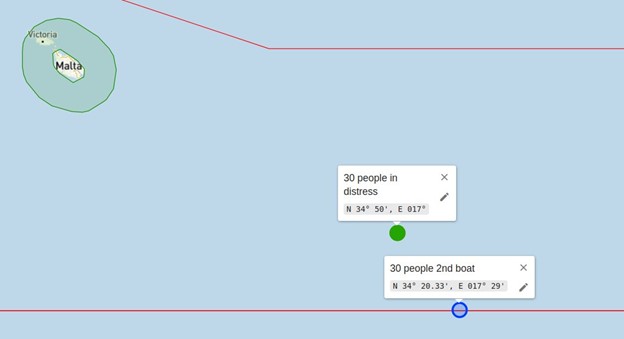
Position of the two boats in distress. Positions added by Alarm Phone
On 17 April, a joint statement by civil search and rescue organisations and migrants solidarity networks on the situation in Tunisia was published as the EU plans to declare Tunisia a safe country.On 20 April, the Humanity 1, after rescuing 69 people who had alerted Alarm Phone, was assigned the remote Ravenna in northern Italy as a port of safety. SOS Humanity decided together with SeaEye to take Italy to court in Rome to show that this “distant ports policy” was unlawful.
On 21 April, the Ocean Viking eventually found and rescued 29 people who had alerted Alarm Phone from an unworthy fiberglass boat, at sea for already five days. While the Ocean Viking proceeded to the evacuation of those in distress, a Maltese helicopter was circling over the dinghy and an Italian patrol vessel was also present on scene, without either of the two assisting in the search nor supporting with coordination. Shortly after the evacuation, Italian authorities assigned Bari as a Place of Safety, 770 km away.
On 22 April, approximately 500 people from a fishing boat were rescued in an operation coordinated by the Italian Coast Guard and brought to Sicily.
On 23 April, Alarm Phone was alerted by a group of 38 people who tried to flee Tunisia but got attacked by the Tunisian Garde Nationale who stole their engine.
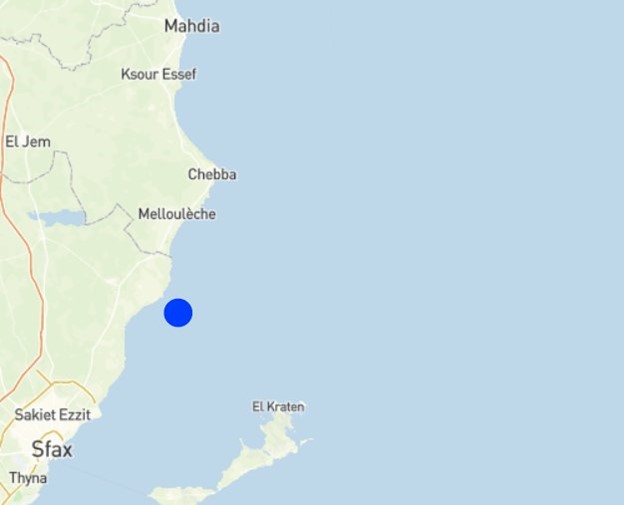
Map showing the position of the boat attacked by the Tunisian National Garde. Position added by Alarm Phone
On the same day, Alarm Phone was alerted to 15 boats in distress, fleeing Tunisia. We were also aware of even more boats. Some of them were intercepted by the Tunisian authorities.
On 24 April, several shipwrecks occurred: A boat with over 50 people on board sunk a few miles from Lampedusa. It was rescued by a fishing boat, but 20 people were missing and one body was recovered. Tunisia’s navy recovered 31 dead bodies off the coast of Sfax. At several Tunisian coastal places, bodies of drowned people were washed up. At the same time, Alarm Phone was alerted to 26 distress situations at sea.
On 25 April, landings in Lampedusa continued and the hotspot reached 2,698 people.
On the same day, a boat sank off the coast of Qarabuli with more than 60 people. There were reports of only five survivors and eleven bodies recovered. From another shipwreck off Libya, the bodies of 57 people were recovered.
On 26 April, Alarm Phone published testimonies from refugees in Tunisia about their protest sit-in and its violent eviction.
On 27 April, Alarm Phone was alerted by two boats escaping Libya. The boat carrying around 50 people was probably among the many that arrived in Lampedusa. The other boat with 29 people on board was finally rescued by the Ocean Viking on 29 April.
On 28 April, the EU Commissioner for Home Affairs was in Tunisia and pushed through her “Anti-Smuggling Partnership”. The country receives equipment for border surveillance, police cooperation, agreements with Europol and is to take back deportees.
On 29 April, the merchant vessel Grimstad rescued about 30 people in distress after Libya denied being the responsible authority and was ordered by MRCC Rome to break international law and take the people to Libya.
On 30 April, Italy denied to have given any order to the commander of the merchant ship but claims that he had acted in coordination with the Libyan authorities.
May
In May, Alarm Phone was alerted to 58 boats in distress. 31 of them departing from Libya and 27 from Tunisia. Five of these boats were rescued by NGO vessels, at least seven arrived in Lampedusa, nine were rescued in coordinated operations by the Italian Coast Guard and merchant vessels and brought to Sicily or Calabria. We know of six shipwrecks (none of which were Alarm Phone cases).
On 1 May, the Libyan Al-Maya Coast Security intercepted a large fishing vessel off the coast of Zuwarah with hundreds of people on board.
On the same day, the Geo Barents rescued two boats, one carrying 300 people, the other one 36. Both had called Alarm Phone. The day before, Malta had ordered a merchant vessel not to rescue the 36 people, claiming they were not in danger on the overcrowded boat.
On 4 May, Italian Premier Minister met General Khalifa Haftar in Rome to discuss how to stop “migration flows” from East Libya to Italy.
On 6 May, Tunisian authorities intercepted a boat of 35 people on the move, encircled them, conducted dangerous manoeuvres with a risk of overturning the boat and beat the people. In the night before, a small boat sank in Maltese SAR zone, about 42 miles from Lampedusa. The Nadir was able to rescue 38 people, who had already been taken on board by three fishing boats. But at least three people drowned according to the survivors.
On 7 May, the Nadir found an overcrowded wooden boat with two decks and 130 people on board. They had alerted Alarm Phone and already been drifting in the open sea for three days. In desperation, some people wanted to swim to the Nadir. When the Italian Coast Guard came, panic broke out and some people fell into the water during takeover. But eventually, all were rescued.
On 6 and 7 May, 1,326 people landed in Lampedusa in 24 hours, most of them had left from Libya.
On 8 May, Alarm Phone was alerted to four boats which had departed from East Libya and were in the Maltese SAR zone in bad weather. Ships in the area were alerted but this did not mean that rescue was coordinated by Malta.
Only on 9 May did we learn that the merchant vessel CMA CGM Iskenderun which was coordinated by Italy had rescued two of these boats. One was rescued by the Italian Coast Guard. The fourth boat was rescued by the cargo ship Vera A. All people were brought to Calabria.
On 11 May, 200 people on a fishing vessel, who had departed from Zuwara and called Alarm Phone, arrived in pouring rain and rough seas in Lampedusa.
On 15 May, the Italian Interior Minister Piantedosi visited Tunisia and had talks with his Tunisian counterpart Fekhi and the President Kais Saied. Aid, assistance, support in intelligence activities and joint repatriation programs to stop migrant trafficking and to stem the influx of irregular arrivals were on the agenda.
On 16 May, the Geo Barents rescued 26 people who had alerted Alarm Phone when trying to escape from Libya.
On 17 May, Refugees in Tunisia held a peaceful manifestation at the UNHCR headquarters in Tunis to demand evacuations.
On 18 May, a relative informed Alarm Phone about a boat with around 47 people on board, who had left from Benghazi and had problems with their engine.
Only on 20 May, did we learn that the container ship Cape Franklin had rescued the boat, carrying 48 (not 47) people. They were disembarked in Pozzallo, Sicily.
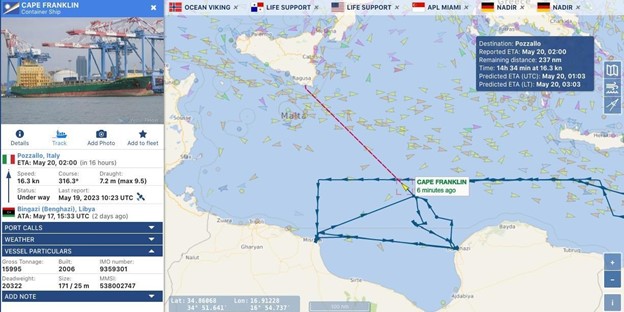
Map showing the track of the merchant vessel Cape Franklin. Source: vesselfinder.com
On 23 May, first landings at Lampedusa occurred after twelve days of bad weather.
On the same day, Alarm Phone was alerted to a large boat in distress in Maltese SAR zone. The approximately 500 people reported that they had fled from Libya several days ago and that their engine had stopped. The NGO ship Life Support proceeded towards the boat, but was still about 24 hours away. Alarm Phone lost contact to the boat on 24 July. Authorities did not give any answers during the following days.
Only on 26 May, did we learn that the boat was pushed back to Libya and the people were imprisoned in Benghazi. We found out that the people were not rescued but towed back over 330 km to Libya. Some of them would board the boat that would capsize weeks later off Pylos, Greece.
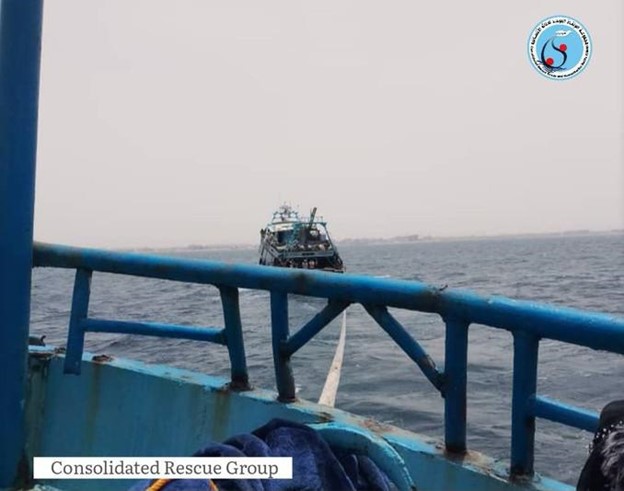
The ~500 people being towed back to Libya. Photo: Consolidated Rescue Group
On 24 May, Alarm Phone was alerted by two boats in distress. The first one, carrying about 27 people, was in international waters off Libya. MRCC Rome instructed the merchant vessel Long Beach to move to the boat.
On 25 May, we learned that this boat was illegally pushed back to Libya. The second boat with over 500 people on board called from the shared SAR zone of Malta and Italy.
One day later we got the confirmation that this boat was rescued to Italy. They were even 671, not 500, people on board.
On 25 May, two big boats, carrying altogether approximately 1,200 people, all departing from East Libya, were rescued by the Italian Coast Guard to Italy.
On 26 May, 88 people who had alerted Alarm Phone were rescued by the Humanity 1. They had been at sea for three days after departing from Tobruk. The Humanity 1 was assigned the port of Livorno, 1,400 km away.
On 27 May, the Geo Barents, still conducting trainings off the Sicilian coast, was contacted by MRCC Rome to assist an overcrowded boat with 599 people on board. They were immediately assigned the port of Bari.
On 28 May, Libyan Special Naval Forces intercepted a large fishing boat off the coast of Tobruk.
During the night 28/29 May, again many boats landed on Lampedusa. Some had left from Libya, others from Tunisia. Nadir assisted 36 people on a steel boat, until the Italian Coast Guard arrived. During the next two days, the Tunisian Garde National intercepted 656 people, heading towards Lampedusa.
On 30 May, Alarm Phone was alerted to a boat carrying about 400 people in distress in the Maltese SAR zone. Our last contact to the group was one day later when the boat was already 20nm off Italian shore. We hope that they were rescued to Italy.
On 31 May, a shipwreck occurred off Tunisia. The day before, Alarme Phone was informed about a boat with around 41 people who had fled from Tunisia. A survivor reported that 13 people died, the others were returned to Tunisia.
On the same day, a crackdown on refugees in Tobruk left several people dead, dozens wounded and over 2,400 arbitrarily detained. Their homes were ransacked and all their belongings were destroyed or seized. This happened after Haftar’s visit to Rome a few weeks ago to discuss about migration with the Meloni government and on the same day when a Maltese delegation met the Eastern Libya military leader in Benghazi.
June
In June, Alarm Phone was alerted to 127 boats, among them 50 departing from Libya and 77 from Tunisia. Five of these boats were rescued by NGO vessels (two off Tunisia, three off Libya), four by merchant vessels, three of them coordinated by the Italian Coast Guard and brought to Italy, one to Malta. One boat was pushed back to Libya by a commercial ship. We know of eleven interceptions by the so-called Libyan Coast Guard. We learned about 14 shipwrecks (ten off Libya, four off Tunisia; none of which were Alarm Phone cases).
On 1 June, raids and deportations took place in East Libya. Thousands of people were violently expelled to Egypt. They had to walk on foot to the border at Saloum.
On 2 June, the NGO sailing ship Mare*Go was blocked for 20 days in the port of Lampedusa after refusing to go to the assigned port of Trapani.
On 3 June, the Nadir and the Humanity 1 rescued several boats between Tunisia and Lampedusa and during the week, about 1,200 people arrived on the island. Alarm Phone was alerted to some of them.
On 4 June, UNHCR announced that more than 100 refugees were flown out of Libya for resettlement to Norway.
On 5 June, the Italian Coast Guard rescued about 1,000 people from three large boats in the Ionian Sea, among them probably 128 people who had alerted Alarm Phone.
On 6 June, civil society actors organized a protest in Tunis against the visit of Meloni to denounce the ongoing dying at sea, to stop deportations and to fight for freedom of movement. The mission of the Italian Prime Minister was to unblock IMF funding for Tunisia and prevent new departures towards Europe.
On 8 June, border violence in Sfax, Tunisia, escalated: Masked Tunisian forces beat up people violently after intercepting them at sea.
On 10 June, European Commission President von der Leyen, together with Italian Premier Minister Meloni and Dutch Prime Minister Rutte, arrived in Tunis to meet with President Kais Saied and to discuss issues of migration and economic cooperation. “Team Europe” embraced authoritarian leader Saied as a ‘valuable partner’, granting hundreds of million in exchange for pulling back migrants escaping Tunisian violence.
On the same day, Alarm Phone was alerted by 25 people on a boat in distress. Malta ordered merchant vessels not to rescue. Finally they were rescued by the Geo Barents on 12 June.
On 11 June, Alarm Phone got a distress call from about 400 people south of Sicily. We learned that the Italian Coast Guard rescued the people and also 130 others. All were brought to Sicily.
On 13 June, Alarm Phone was alerted by a boat, carrying about 750 people, in distress in the Greek SAR zone. It had left from Libya.
Until shortly after midnight of 14 June, we were in continuous contact with the boat that reportedly capsized. Hundreds of people drowned near Pylos. We published a statement with a timeline of the events. Later it was revealed that the Greek Coast Guard did not only delay rescue, but can be assume to have even caused the sinking of the boat.
On 17 June, the Nadir assisted around 35 people on a wooden boat and took them on board, until the Italian Coast Guard took them over. The Open Arms rescued 117 people, among them probably some who had called Alarm Phone.
On 19 June, 29 people contacted Alarm Phone in distress in Maltese SAR.
On 20 June we learned that the merchant vessel Greta had rescued them and was waiting outside Maltese territorial waters – hopefully to disembark them in Malta.
On 21 June, a shipwreck occurred off Lampedusa. Nadir was asked by the Italian Coast Guard, who rescued 44 survivors, to assist in the search of three missing persons. They searched without result.
On the same day, a court in Rome ruled in favour of the new provisions allowing the government to assign the distant northern disembarkation ports of Ancona and La Spezia to MSF’s Geo Barents.
On 22 June, Alarm Phone was alerted from a boat in distress off Benghazi, adrift near the Libyan coast. The so-called Libyan Coast Guard refused to search for them.
One day later, we learned that the group of 47 people was rescued by the merchant vessel Valpiave off Libya and disembarked in Pozzallo, Italy. Another boat, carrying 14 people in Maltese SAR zone, was rescued two days later by the Geo Barents. But survivors told that one of the group members had fallen in the sea and could not be retrieved.
On 23 June, another shipwreck occurred off Lampedusa. About 40 people were feared dead.
On the same day, Alarm Phone was alerted by about 50 people in distress who had escaped from Libya.
On 24 June, we learned that these people were pushed back to Libya after the merchant vessel Manta Zuhal had taken them on board.
On 25 June, Alarm Phone was in contact with a boat that had left from Tobruk, carrying 104 people. The people were rescued by the merchant vessel Iblea and brought to Italy.Another boat with around 31 people on board, coming from Benghazi, who also called us, was rescued one day later by the merchant vessel Maersk Valletta and taken to Italy.
On 28 June, action days started in Brussels: A reading of all unanswered emails sent to the European Maritime Rescue Coordination Centres concerning distress situations at sea took place in front of the EU Parliament. Also Refugees in Libya activists from Tunisia and Niger held a press conference and were invited to a roundtable by members of the European Left.
Over the following days, a conference took place and on Saturday, 1 July, a demonstration was organized.
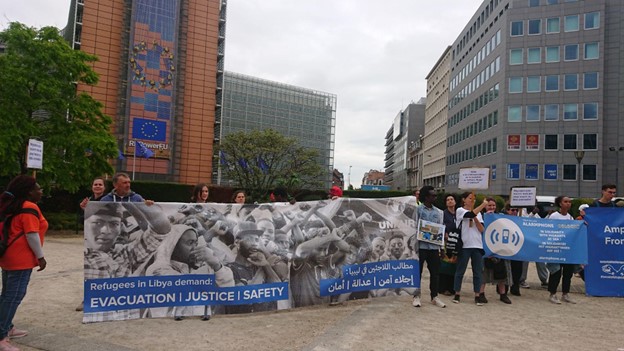
Demonstration on 1 July in Brussels. Source: Alarm Phone
On 29 June, a boat carrying 41 people, who had called Alarm Phone and were already at sea for three days, was rescued by the Mare*Go.
On the same day, another boat with 20 people on board alerted Alarm Phone. They had escaped from Sabratah, Libya. The people were finally rescued to Lampedusa by the Italian Coast Guard.
On 30 June, we learned via relatives that a boat carrying about 40 people, who had called us in severe distress the day before, was rescued by a fisherman.